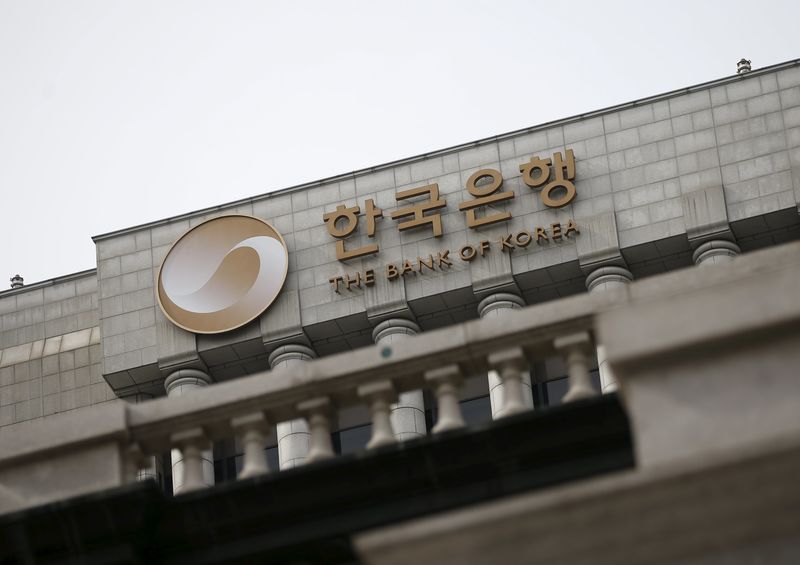 © Reuters. Bank of Korea Decision-Day Guide: Speculation of Rate Hike Cools
© Reuters. Bank of Korea Decision-Day Guide: Speculation of Rate Hike Cools(Bloomberg) — South Korea’s central bank is expected to keep its benchmark interest rate unchanged on Friday, as slowing job growth and global trade battles raise concerns about the outlook for the export-dependent economy.
The Bank of Korea will likely keep the seven-day repurchase rate at 1.5 percent, where it has stood since the central bank raised it from a record-low in November. Seventeen of 18 economists surveyed by Bloomberg predicted no change.
BOK Governor Lee Ju-yeol has cited financial imbalances and the need to create room for policy responses to an economic downturn as reasons for a possible rate hike. But the slowest job creation in more than eight years and the escalating trade fight between the U.S. and China have cooled speculation about that happening anytime soon.
“Policy tightening by the BOK looks increasingly daunting, especially when the government is trying to boost fiscal spending to spur growth,” said Park Jeong-woo, an economist at Korea Investment & Securities Co.
Competing Pressures
At the July meeting, some BOK board members argued for reducing policy accommodation, according to minutes from the meeting. Record household debt and surging property prices are among their concerns. One member even dissented from the decision to keep rates unchanged, stoking speculation that a rate increase was on the way.
Some policy makers have expressed concern that the growing gap between benchmark rates in South Korea and the U.S. might fuel capital outflows, creating instability in Korean financial markets. The rate differential has widened to as much as 50 basis points, and could grow again if the Federal Reserve hikes in September as expected.
On the other hand, job growth in July hit the lowest level since 2010, jolting policy makers. Finance Minister Kim Dong-yeon described employment conditions as “extremely difficult” and vowed to use fiscal stimulus to help.
While the BOK expects inflation to gradually pick up and approach its 2 percent target sometime in the fourth quarter, for now price gains remain subdued, easing any pressure on the central bank to act in the near term. Consumer prices rose 1.5 percent in July from a year earlier.
Growing Pessimism
Consumer confidence fell in August to the lowest level since March last year, when the country was rattled by a corruption scandal that eventually saw former President Park Geun-hye impeached and imprisoned.
President Moon Jae-in, who took office pledging to create more jobs and raise pay for average Koreans, is looking to stoke the economy with fiscal stimulus. The government this week proposed spending a record 471 trillion won ($420 billion) next year, with a goal of adding new jobs, raising the minimum wage again and prodding innovative growth.
The central bank usually announces its decision at about 10 a.m. in Seoul, followed by a policy statement that includes assessments of the economy and inflation. Lee is scheduled to brief the press at 11:20 a.m.
Fusion Media or anyone involved with Fusion Media will not accept any liability for loss or damage as a result of reliance on the information including data, quotes, charts and buy/sell signals contained within this website. Please be fully informed regarding the risks and costs associated with trading the financial markets, it is one of the riskiest investment forms possible.
Source: Investing.com





























